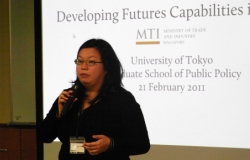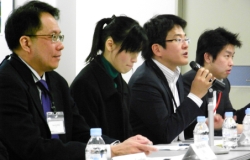LKY-GraSPP Day 2011
Conference Report
On Feburary 21st, the University of Tokyo Graduate School of Public Policy (GraSPP) hosted a student conference with Singapore's Lee Kwan Yew School of Public Policy (LKY). While we have had student conferences with other institutions in the past, this was our first official conference with Singapore's premiere graduate school. The conference proved to be a big success with over 60 students registering for the event, eager to hear about the latest in Asian public policy.
The day commenced with our very own Professor Tanaka's speech on East Asian regionalism. In his speech, Professor Tanaka advocated “rules-based” policy and standard-setting as the guiding principles of East Asian regional politics and further commented, “nations will change in the right circumstances.” His remark on the rise of China sparked much needed energy, resulting in fierce questions by the audience.
 The conference proceeded with intellectually stimulating presentations
by the guest presenters from LKY: Ms. Cheryl Chung from the Ministry
of Trade and Industry of Singapore; Ms. Michelle Tan, an administrator
at the National University Hospital of Singapore; Mr. Chew Kia Sheng
from the Ministry of Education of Singapore; and Mr. Daisuke Asano
from the Ministry of Economics, Trade and Industry (METI) of Japan,
currently studying at LKY.
The conference proceeded with intellectually stimulating presentations
by the guest presenters from LKY: Ms. Cheryl Chung from the Ministry
of Trade and Industry of Singapore; Ms. Michelle Tan, an administrator
at the National University Hospital of Singapore; Mr. Chew Kia Sheng
from the Ministry of Education of Singapore; and Mr. Daisuke Asano
from the Ministry of Economics, Trade and Industry (METI) of Japan,
currently studying at LKY.
Ms. Chung's lively presentation on industrial policy highlighted the importance of future trend watching in an advanced, knowledge-based economy like Singapore. The Futures Group, a group within the Ministry of Trade and Policy of Singapore where Ms. Chung belongs, anticipates the unforeseen and networks across divisions to formulate executable actions based on ideas. Perhaps the most notable commentary offered by Ms. Chung was on Singapore's readiness to implement other jurisdiction's policies when and where possible “like a scout.”
Second presentation by Mr. Kia Sheng, an educator himself, offered insight on Singapore's education system. According to Mr. Sheng, the bilingual education system is what allows Singapore to maintain its competitive edge both in Asia and in the world. Furthermore, Singapore has a very rigorous recruiting system with only the best teachers and school leaders selected. The National Institute of Education offers the training for the teachers with many continuous education opportunities for the teaching professionals. Throughout his presentation, Mr. Sheng highlighted Singapore's ability to multilaterally target policy problems, effectively incorporating the education system as the means to meet their ends.
Ms. Tan's presentation on healthcare system illustrated the efficiency and accessibility of Singapore's healthcare system. Healthcare in Singapore is highly advanced with the latest medical technologies offered equally to all nationals residing in Singapore. While healthcare systems in all jurisdictions may have their own merits and shortcomings, it seems that we can all learn from Singapore's efficient and advanced healthcare system, currently rated number one in Asia.
The last presentation focused on developmental policies of South Asia. The presentation accompanied by photographs from the various study trips personally taken by Mr. Asano, the presenter, elucidated the difference between the developed and developing states of Asia. Through Mr. Asano's presentation, perhaps some of the audience members found new reasons and motivations to engage in public policy as a tool to empower the ones in need.
 The lively Q&A session that followed highlighted the diverse
backgrounds from which both the presenters and the participants
possess; moreover, the session was a true testament of the
participants' curiosity and commitment to the field of public policy.
The lively Q&A session that followed highlighted the diverse
backgrounds from which both the presenters and the participants
possess; moreover, the session was a true testament of the
participants' curiosity and commitment to the field of public policy.
The conference also included a reception at Capo Pellicano, where students interacted to ask more questions about the presentations and engaged in lively yet casual debates about international affairs. All in all, GraSSP Day 2011 was a big success with many new friendships formed, knowledge gained and enthusiasm for public policy heightened. We hope to see more interactions with institutions from abroad!

